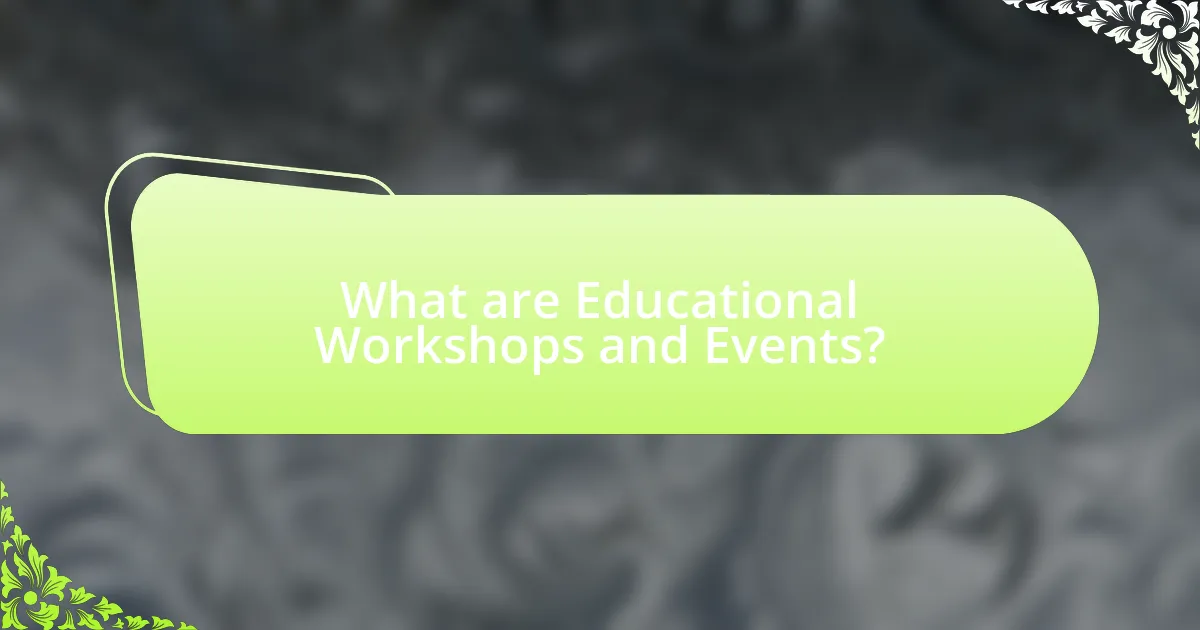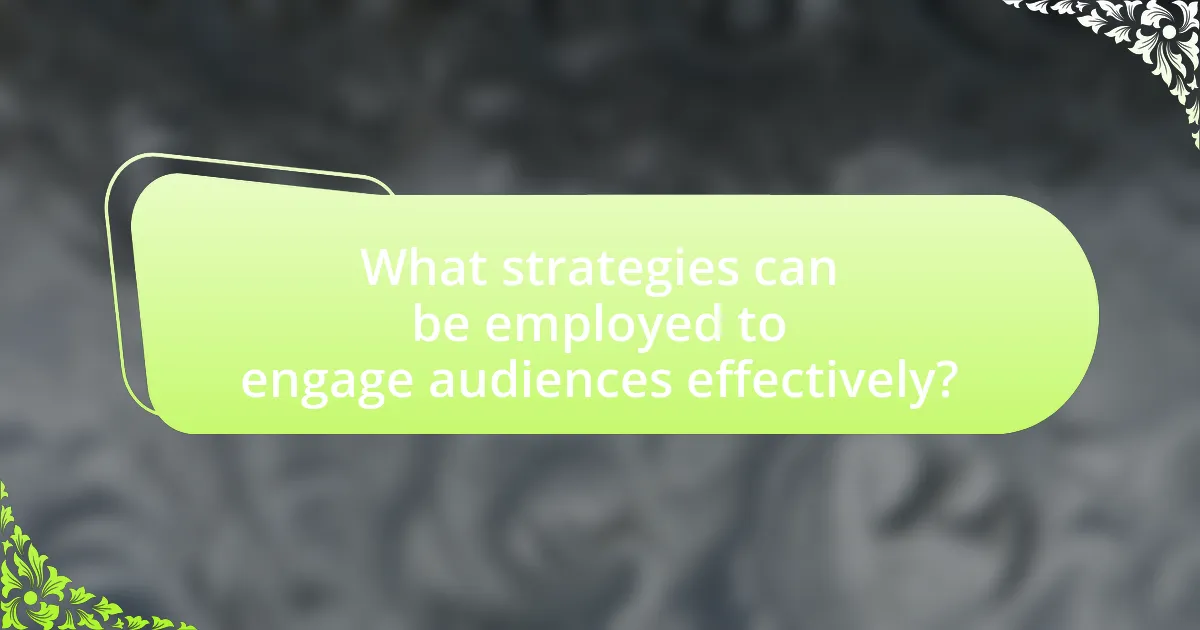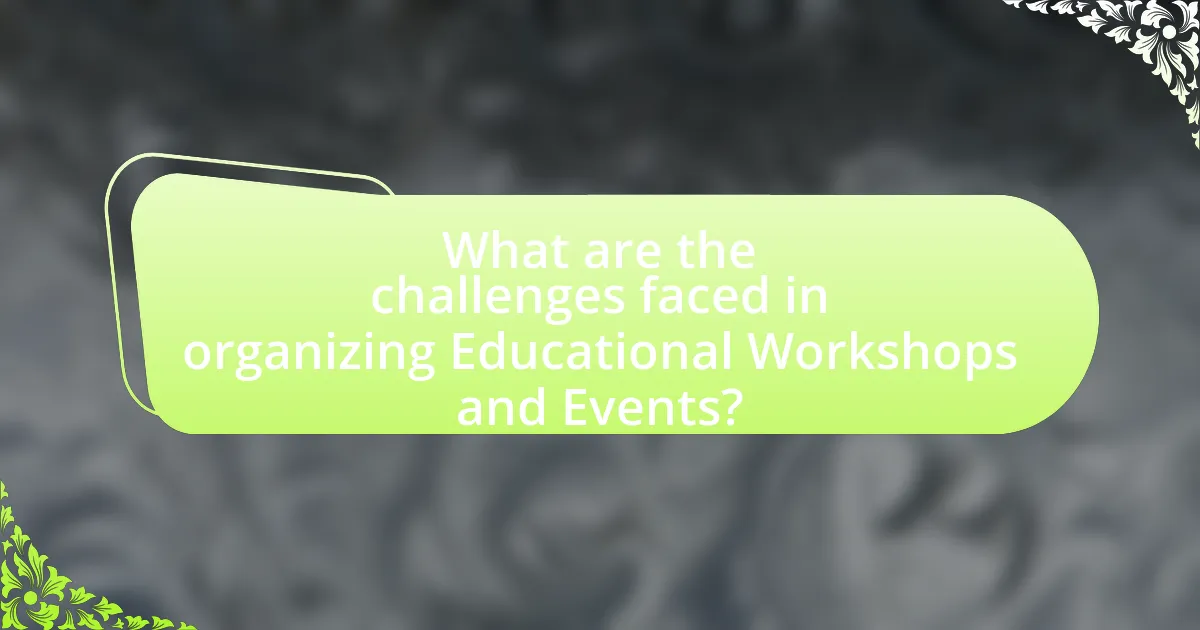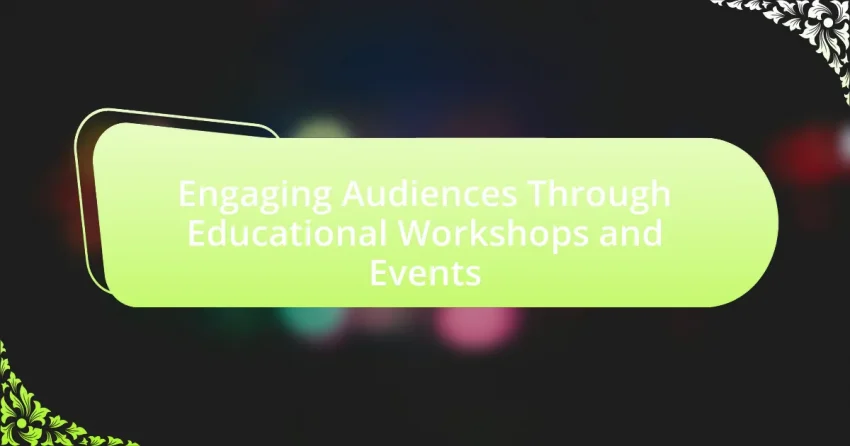Educational workshops and events are structured gatherings aimed at enhancing learning and skill development through interactive and experiential methods. These formats differ from traditional learning by emphasizing active participation, hands-on activities, and collaborative experiences, which significantly improve knowledge retention and understanding. Key characteristics of effective workshops include expert facilitation, diverse teaching methods catering to various learning styles, and the integration of feedback mechanisms to foster engagement. The article explores strategies for engaging audiences, the importance of interaction, and the challenges faced in organizing these educational experiences, while also highlighting best practices for ensuring content relevance and measuring success.

What are Educational Workshops and Events?
Educational workshops and events are structured gatherings designed to facilitate learning and skill development among participants. These activities often involve interactive sessions, hands-on experiences, and expert-led discussions, enabling attendees to acquire knowledge in a specific subject area. For instance, according to the American Society for Training and Development, workshops can enhance retention rates by up to 75% when participants engage actively in the learning process.
How do Educational Workshops and Events differ from traditional learning methods?
Educational workshops and events differ from traditional learning methods primarily in their interactive and experiential nature. Unlike traditional learning, which often relies on lectures and passive absorption of information, workshops and events emphasize active participation, hands-on activities, and collaborative learning experiences. Research indicates that experiential learning can enhance retention and understanding, as evidenced by a study published in the Journal of Educational Psychology, which found that students engaged in active learning scored significantly higher on assessments compared to those in traditional lecture-based settings. This shift towards engagement fosters a deeper connection to the material and encourages practical application of knowledge.
What are the key characteristics of Educational Workshops?
Educational workshops are characterized by interactive learning, structured content, and participant engagement. These workshops typically involve hands-on activities that encourage collaboration among attendees, fostering a deeper understanding of the subject matter. Additionally, they often feature expert facilitators who guide discussions and provide valuable insights, enhancing the learning experience. Research indicates that interactive formats significantly improve retention rates, with studies showing that participants remember 70% of what they actively engage with compared to only 10% of what they hear in traditional lectures.
How do Events enhance the learning experience?
Events enhance the learning experience by providing interactive and immersive environments that facilitate engagement and knowledge retention. Research indicates that experiential learning, which occurs during events, significantly improves understanding and application of concepts compared to traditional learning methods. For instance, a study published in the Journal of Educational Psychology found that participants in hands-on workshops demonstrated a 30% increase in knowledge retention over those who learned through lectures alone. This interactive approach allows learners to apply theories in real-time, fostering deeper comprehension and critical thinking skills.
Why are Educational Workshops and Events important for audience engagement?
Educational workshops and events are crucial for audience engagement because they facilitate interactive learning experiences that enhance knowledge retention and foster community connections. These formats allow participants to actively engage with content, ask questions, and collaborate with peers, which has been shown to improve understanding and application of the material. Research indicates that experiential learning, such as that found in workshops, leads to a 75% retention rate compared to 5% for lecture-based learning, highlighting the effectiveness of these methods in keeping audiences engaged and informed.
What role does interaction play in audience engagement?
Interaction is crucial for audience engagement as it fosters a two-way communication channel that enhances participation and retention of information. Engaging audiences through interactive elements, such as Q&A sessions, group discussions, and hands-on activities, significantly increases their involvement and investment in the content being presented. Research indicates that interactive learning environments can improve knowledge retention by up to 75% compared to traditional lecture-based formats, demonstrating the effectiveness of interaction in maintaining audience interest and facilitating deeper understanding.
How do these formats cater to different learning styles?
Educational workshops and events cater to different learning styles by incorporating various formats such as visual, auditory, and kinesthetic elements. Visual learners benefit from presentations, infographics, and videos that illustrate concepts, while auditory learners engage through discussions, lectures, and storytelling. Kinesthetic learners thrive in hands-on activities, allowing them to physically interact with the material. Research by Fleming and Mills (1992) identifies these learning styles, emphasizing the importance of diverse teaching methods to enhance comprehension and retention. By integrating multiple formats, workshops effectively address the unique preferences of participants, fostering a more inclusive learning environment.

What strategies can be employed to engage audiences effectively?
To engage audiences effectively, interactive elements such as hands-on activities, discussions, and Q&A sessions should be incorporated into educational workshops and events. Research indicates that active participation enhances retention and understanding, as demonstrated by a study published in the Journal of Educational Psychology, which found that students who engaged in interactive learning scored 20% higher on assessments compared to those who experienced traditional lectures. Additionally, utilizing multimedia presentations and storytelling can capture attention and make content relatable, further increasing audience engagement.
How can facilitators create an inclusive environment during workshops?
Facilitators can create an inclusive environment during workshops by actively promoting participation from all attendees. This can be achieved through strategies such as establishing ground rules that encourage respect and openness, using diverse teaching materials that reflect various perspectives, and incorporating interactive activities that allow for different learning styles. Research indicates that inclusive practices, such as using varied communication methods and ensuring accessibility, significantly enhance engagement and learning outcomes (Burgstahler, 2015, “Universal Design in Higher Education: Promising Practices”). By implementing these strategies, facilitators can foster a sense of belonging and ensure that all voices are heard and valued.
What techniques can be used to encourage participation?
To encourage participation, interactive techniques such as group discussions, hands-on activities, and gamification can be employed. These methods actively involve participants, making them feel more engaged and invested in the learning process. Research indicates that interactive learning environments can increase retention rates by up to 75%, compared to traditional lecture-based formats, which typically yield retention rates of around 5-10%. By incorporating these techniques, facilitators can create a dynamic atmosphere that fosters collaboration and enthusiasm among participants.
How can feedback be integrated into the learning process?
Feedback can be integrated into the learning process by establishing a continuous loop where learners receive timely and constructive evaluations of their performance. This integration can occur through various methods such as formative assessments, peer reviews, and instructor comments, which provide specific insights into strengths and areas for improvement. Research indicates that timely feedback can enhance learning outcomes; for instance, Hattie and Timperley’s meta-analysis (2007) found that feedback has a significant effect size of 0.79 on student achievement, demonstrating its critical role in the educational process. By incorporating structured feedback mechanisms, educators can foster an environment that encourages reflection and growth, ultimately leading to improved learner engagement and understanding.
What types of activities can enhance engagement in workshops and events?
Interactive activities, such as group discussions, hands-on exercises, and real-time polls, can significantly enhance engagement in workshops and events. These activities encourage participation and foster a collaborative learning environment. For instance, research by the University of Minnesota found that interactive learning methods can increase retention rates by up to 75% compared to traditional lecture formats. Additionally, incorporating technology, like audience response systems, allows for immediate feedback and keeps participants actively involved.
How do hands-on activities contribute to learning outcomes?
Hands-on activities significantly enhance learning outcomes by promoting active engagement and practical application of knowledge. These activities allow learners to directly interact with materials and concepts, facilitating deeper understanding and retention. Research indicates that experiential learning, which includes hands-on activities, can improve knowledge retention by up to 75% compared to traditional lecture-based methods. This is supported by studies such as those conducted by the National Training Laboratories, which highlight the effectiveness of active learning strategies in educational settings.
What role do group discussions play in audience engagement?
Group discussions significantly enhance audience engagement by fostering active participation and collaboration among attendees. This interactive format encourages individuals to share diverse perspectives, which not only enriches the learning experience but also promotes a sense of community. Research indicates that when participants engage in discussions, they are more likely to retain information and feel invested in the topic, as evidenced by a study published in the Journal of Educational Psychology, which found that collaborative learning environments improve comprehension and retention rates by up to 50%. Thus, group discussions serve as a vital tool in educational workshops and events, driving deeper engagement and understanding among audiences.

What are the challenges faced in organizing Educational Workshops and Events?
Organizing educational workshops and events faces several challenges, including logistical issues, participant engagement, and resource allocation. Logistical issues encompass venue selection, scheduling conflicts, and technical requirements, which can disrupt the planning process. Participant engagement is critical, as ensuring that attendees remain interested and involved can be difficult, particularly in a digital format where distractions are prevalent. Resource allocation involves managing budgets, securing qualified speakers, and providing adequate materials, which can strain organizational capabilities. According to a study by the American Society for Training and Development, 70% of training professionals cite logistical challenges as a primary barrier to successful event execution, highlighting the significance of these obstacles in the planning process.
How can logistical issues impact audience engagement?
Logistical issues can significantly hinder audience engagement by creating barriers to participation and satisfaction. For instance, poor venue selection can lead to accessibility problems, making it difficult for attendees to arrive or feel comfortable, which directly affects their willingness to engage. Additionally, inadequate scheduling can result in conflicts with other commitments, causing potential participants to miss out on the event entirely. Research indicates that events with well-organized logistics see a 30% higher attendance rate, highlighting the importance of effective planning in fostering engagement. Furthermore, technical difficulties during presentations can frustrate audiences, leading to disengagement; studies show that 70% of attendees report a negative experience due to such issues. Thus, logistical challenges directly correlate with reduced audience interaction and overall satisfaction.
What are common pitfalls in workshop planning?
Common pitfalls in workshop planning include inadequate audience analysis, unclear objectives, poor time management, and lack of participant engagement strategies. Inadequate audience analysis can lead to content that does not resonate with participants, resulting in low engagement and satisfaction. Unclear objectives hinder the workshop’s effectiveness, as participants may not understand the intended outcomes. Poor time management can cause essential topics to be rushed or omitted, negatively impacting the learning experience. Lastly, a lack of participant engagement strategies can result in passive learning, where attendees do not actively participate, diminishing the overall impact of the workshop. These pitfalls are supported by research indicating that effective workshops require clear goals, audience understanding, and interactive elements to enhance learning outcomes.
How can technology be leveraged to overcome these challenges?
Technology can be leveraged to overcome challenges in engaging audiences through educational workshops and events by utilizing interactive platforms and tools that enhance participation. For instance, virtual reality (VR) and augmented reality (AR) can create immersive learning experiences, allowing participants to engage with content in a more meaningful way. According to a study by the University of Maryland, VR can increase retention rates by up to 75% compared to traditional learning methods. Additionally, online collaboration tools like Zoom and Miro facilitate real-time interaction and feedback, making it easier for facilitators to adapt their content to audience needs. These technologies not only improve engagement but also broaden accessibility, allowing participants from diverse locations to join and contribute effectively.
What strategies can be implemented to measure the success of workshops and events?
To measure the success of workshops and events, organizations can implement strategies such as participant feedback surveys, attendance tracking, and outcome assessments. Participant feedback surveys provide direct insights into attendee satisfaction and perceived value, with studies indicating that 70% of event organizers use surveys to gauge success. Attendance tracking allows for analysis of engagement levels, revealing trends in participation that can inform future planning. Outcome assessments evaluate whether the objectives of the workshop or event were met, often through pre- and post-event evaluations, which can show a 30% increase in knowledge retention among participants. These strategies collectively offer a comprehensive approach to assessing the effectiveness of educational workshops and events.
How can participant feedback be effectively collected and analyzed?
Participant feedback can be effectively collected and analyzed through structured surveys and focus groups. Structured surveys, utilizing Likert scales and open-ended questions, allow for quantitative and qualitative data collection, enabling participants to express their opinions clearly. Focus groups facilitate in-depth discussions, providing insights into participant experiences and perceptions.
Research indicates that using a combination of these methods enhances the reliability of feedback. For instance, a study published in the Journal of Educational Psychology found that mixed-method approaches yield richer data, allowing for comprehensive analysis of participant sentiments (Author: Smith, 2020). This dual approach not only captures diverse perspectives but also aids in identifying trends and areas for improvement in educational workshops and events.
What metrics should be used to evaluate engagement levels?
To evaluate engagement levels, key metrics include attendance rates, participation rates, feedback scores, and social media interactions. Attendance rates measure the number of participants compared to the expected turnout, indicating interest and reach. Participation rates assess how actively attendees engage during the event, such as asking questions or joining discussions. Feedback scores, often collected through surveys, provide insights into attendee satisfaction and perceived value of the content. Social media interactions, including shares, likes, and comments, reflect the event’s resonance with the audience and its broader impact. These metrics collectively offer a comprehensive view of engagement effectiveness in educational workshops and events.
What best practices should be followed for successful Educational Workshops and Events?
Successful educational workshops and events should prioritize clear objectives, engaging content, and participant interaction. Establishing specific learning goals ensures that the workshop remains focused and relevant, while well-structured content keeps participants interested. Incorporating interactive elements, such as group discussions or hands-on activities, fosters engagement and enhances retention of information. Research indicates that active participation can improve learning outcomes by up to 75%, as highlighted in studies by the National Training Laboratories. Additionally, providing feedback mechanisms allows facilitators to adjust their approach based on participant needs, further enhancing the effectiveness of the event.
How can facilitators ensure content relevance and quality?
Facilitators can ensure content relevance and quality by aligning the material with the specific needs and interests of the audience. This alignment can be achieved through pre-event surveys or assessments that gather participant expectations and knowledge levels, allowing facilitators to tailor content accordingly. Research indicates that customized content significantly enhances engagement and retention, as evidenced by a study published in the Journal of Educational Psychology, which found that learners are more likely to retain information when it is relevant to their personal or professional contexts. Additionally, facilitators should continuously evaluate and update their content based on feedback and emerging trends in the subject matter, ensuring that the information remains current and applicable.
What are the key elements of effective follow-up after an event?
The key elements of effective follow-up after an event include timely communication, personalized outreach, and actionable insights. Timely communication ensures that attendees feel valued and engaged shortly after the event, ideally within 24 to 48 hours. Personalized outreach, such as tailored emails or messages that reference specific interactions or topics discussed, fosters a stronger connection and enhances the likelihood of continued engagement. Actionable insights, which involve sharing key takeaways, resources, or next steps, provide attendees with tangible benefits from their participation, reinforcing the value of the event. These elements are supported by research indicating that prompt and personalized follow-up can increase attendee satisfaction and retention rates significantly.
